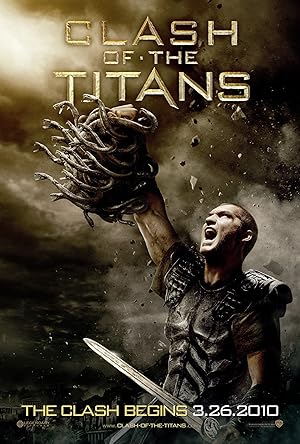Clash of the Titans
| 2010Directed by: Louis Leterrier
Main Plot
Clash of the Titans follows the journey of Perseus, the mortal son of Zeus, as he embarks on a quest to save the city of Argos from the wrath of the monstrous Kraken. After the city’s ruler, King Acrisius, defies the gods and faces dire consequences, Perseus is thrust into a battle against divine forces. Armed with little more than his courage and determination, he gathers a group of warriors to confront various mythical creatures, including the fearsome Medusa. As they navigate treacherous landscapes and face formidable challenges, Perseus must discover his own identity and embrace his heritage. The film explores themes of destiny, bravery, and the struggle between mortals and gods, culminating in an epic showdown that will determine the fate of Argos and the balance between human and divine power.
Characters
- Sam Worthington plays Perseus, a demigod who embarks on a perilous quest to defeat the monstrous Kraken and save humanity from the wrath of the gods.
- Liam Neeson plays Zeus, the king of the gods, who guides and challenges Perseus in his quest to defeat the monstrous Kraken.
- Ralph Fiennes plays Hades, the god of the underworld, who seeks revenge against Zeus and unleashes the monstrous Kraken to destroy humanity.
Ending Explained
In the ending of Clash of the Titans, Perseus confronts the monstrous Kraken, which has been unleashed by the vengeful god Hades to destroy the city of Argos. Armed with the powerful sword given to him by the gods and the shield that reflects light, Perseus leads a group of warriors to battle the Kraken. The climax unfolds as Perseus uses the head of Medusa, which he had previously acquired, to turn the Kraken to stone, ultimately saving Argos from destruction. This pivotal moment resolves the main conflict between the mortals and the gods, showcasing Perseus's growth from a reluctant hero to a courageous leader. The defeat of the Kraken symbolizes the triumph of humanity over divine threats, reinforcing the theme of self-determination against fate. After the battle, Perseus returns to Argos, where he is celebrated as a hero. The resolution of the conflict also highlights the fragile relationship between gods and mortals, as Hades's plans are thwarted, and the balance of power is momentarily restored. The film concludes with Perseus embracing his destiny, having proven himself not only as a warrior but also as a protector of his people, setting the stage for future adventures.
